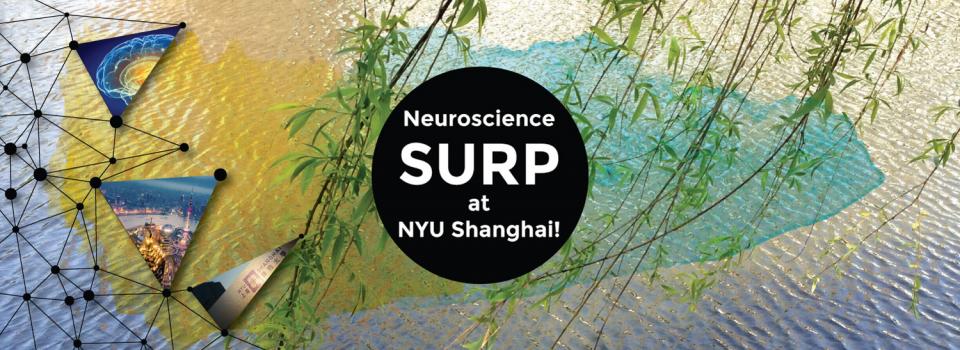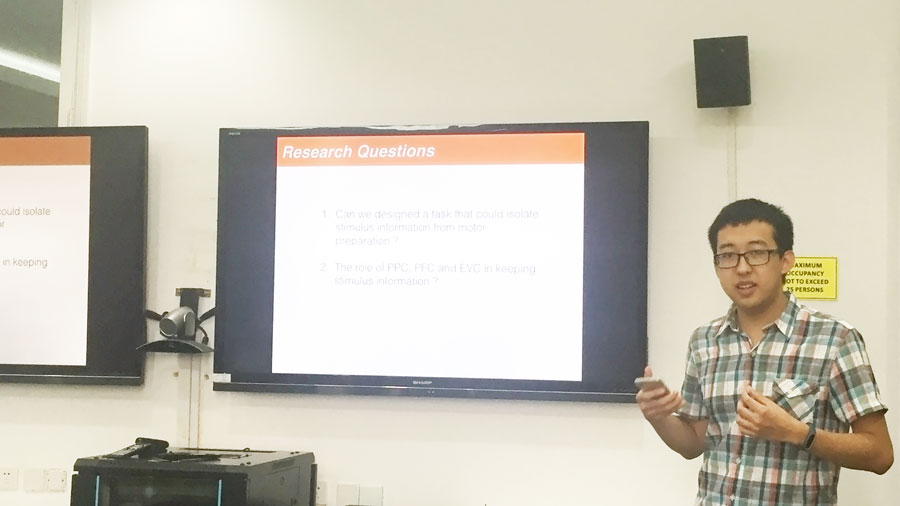Oct 30 2017
Published by
NYU Shanghai

For years, Jingjie Li, a sophomore from Xi’an Jiao Tong University, has been passionate about looking for the key to unlock the mysterious three pounds of matter that sits between his ears. He progresses through conducting independent studies as well as understanding and improving existing models in the field. He has even started to make contributions: his recent manuscript on visual working memory has been accepted to the Visual Science Society Annual Meeting.
When Jingjie became aware of the NYU Shanghai’s new Summer Undergraduate Research Program in Neuroscience (SURP), he went all in. He is among the first group of eight undergraduate students who participated in an intensive 10-week research experience that aims to develop future neuroscientists.
More than an Assistant: A True Taste of Being a Scientist
Jingjie was paired up with Dr. Jeffrey Erlich, Assistant Professor of Neural and Cognitive Sciences at NYU Shanghai for their shared interest in working memory.
| Jingjie Li speaking at the SURP final presentation. |
Jingjie quickly learned to program the state-of-the-art behavioral training system developed by the lab, and he designed a 5-stage experiment protocol to train mice to perform a visual working-memory task. “I was really impressed by Jingjie’s dedication and skills. He made a real contribution during his summer in the lab,” commented Dr. Erlich.
While Jingjie was quite clear about his research direction, Noha Abdelrahman, a student from Cairo University, was just the opposite when she first joined the program. Noha spent some time exploring her research topic before narrowing it down to the investigation into motor-induced and long-term memory speech representations, under tutelage from Dr. Xing Tian, Assistant Professor of Neural and Cognitive Sciences at NYU Shanghai, whose research centered on motor sensory interaction, speech and language.
“I believe I had a unique experience especially from being involved in all research steps - from conceptualizing the study to analyzing and presenting the experimental results. I value the early thinking and planning phase the most, because that’s something you will never read about in the papers!” stated Noha upon completing her project presentation.
SURP @ NYU Shanghai
The SURP @ NYU Shanghai was inspired by a decades-old summer research program at the Center for Neural Science, NYU New York. Following pilot programs under which Chinese students were selected to work at neuroscience labs in New York, it was eventually instituted in China.
Its goal being to incubate future neuroscientists, SURP extends NYU Shanghai's vibrant neuroscience research opportunities to non-NYU Shanghai students both at home and abroad. For this year, applications were received from the US, Korea, Egypt, Hong Kong and mainland China.
To date, SURP may very well be one of the few (if not only) undergraduate neuroscience programs in China under which students can acquire in-depth knowledge and hands-on skills – and earn a stipend – by participating, for an extended period of time, in individualized research projects in the labs of NYU Shanghai neuroscience faculty, with working hours corresponding to those of a full-time student researcher.
“There are very few, if any, opportunities like this in China,” said Jingjie.
Continued Supervision and Connection: SURP and Beyond
Rounding out Jingjie and Noha’s group were six other students: Yuhang Chen, Yuxin Tong, Zihua Liu, Feng Lin, Liang Su and Rui Jin. Other research topics included decision-making mechanisms in rodents, language processing in human brains and the effects of alcohol on human perception and action.
But SURP is only the beginning.
Rui Jin, a psychology student from Hong Kong University, decided to conduct the project for her Bachelor degree’s thesis with Dr. Li Li, her SURP supervisor. So did Feng Lin, a student who worked at Dr. Xing Tian’s lab. Noha Abdelrahman is considering the pursuit of a higher degree with Dr. Tian. Some other students will go back to visit their labs or work remotely to continue their summer projects.
“I will continue the research that I started here,” many said upon completing SURP. “We’ve been nurtured and developed a sense of family,” concluded the students.
To learn more about NYU Shanghai Summer Undergraduate Research Program in Neuroscience (SURP), click here.



